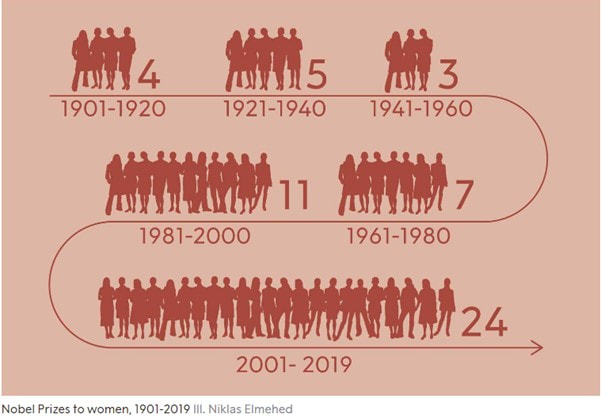|
E-tivities assist with peer learning, build effective learning pods and co-operation, and lead students towards exploring challenging issues together. It’s always worth encouraging them to diagram and visualise outcomes from their collaborative discussions – helping them to mature as learners and present complex ideas better. TITLE: How to win a Nobel prize. PURPOSE: How to win the Nobel Prize. (Also helps with your first assignment). SPARK: https://www.nobelprize.org/prizes/lists/nobel-prize-awarded-women/
https://www.bbc.co.uk/news/science-environment-54432589#:~:text=Emmanuelle%20Charpentier%20and%20Jennifer%20Doudna,DNA%20contained%20in%20living%20cells. INDIVIDUAL : Explore the awarding, to two women scientists, of the 2020 Nobel Prize in Chemistry. They developed the tools to edit DNA. Explore a bit further, find out how Nobel prizes are awarded. Find out the demographics of Nobel prizes generally. Pick one characteristic & post in the forum <link> the statistics you have found about it & one piece of valid evidence offering an explanation (150 words max plus your reference(s)). Post by Monday at 16.00 GMT. PARTICIPATION 1. Respond to at least 3 others of your peers by agreeing or disagreeing (with evidence) about their accounts or interpretations. Complete by Wednesday 16.00 GMT. 2. Meet in your groups of 4 , draw a multiple cause diagram demonstrating why there are inequalities in the awarding of Nobel prizes https://www.futurelearn.com/courses/systems-thinking-complexity/0/steps/20381. Add this to your e -portfolio ready for your assignment. And post in your <Group drive>, alerting me when it’s there. Complete by Friday 16.00 GMT., latest. INTERVENTIONS: I will give feedback on your multiple cause diagrams, Friday to Monday. SCHEDULE & TIME: 2 hours exploring Nobel prizes, the rules, the history & the statistics. At least another hour choosing one demographical element & looking at evidence for explanations or make your interpretations. 60 mins reading classmates' contributions & responding. 2 hours in your groups reminding yourselves about multiple causes in complex systems & developing an excellent diagram & posting it for review. 30 mins reading my feedback & thinking about it for your assignment. Total: Around 5.5 hours spread over one week. Your whole career to try and get a Nobel prize.
1 Comment
 I’m speaking at the Learnovation Summit on 14th October and was interviewed prior to the conference. Learnovation is organised by ‘The Learnovate Centre’, a leading research and innovation centre in learning technologies, based at Trinity College, Dublin. I thought you might like to read the interview. I was asked about whether the dominance of the college or university campus is likely to return - as the world’s most traditional universities adapt for different futures. And I was asked whether institutions have opportunities to ensure students will continue to experience a ‘rite of passage’ - by increasing online collaboration and peer-to-peer interaction through their studies. The original was written by Martha Kearns, from StoryLab Professor Salmon is the founder and CEO of Education Alchemists and spent 30 years in the university sector in the UK and Australia holding various academic and senior positions including Pro Vice-Chancellor (Education). She says: “I don’t think we will be going back to the dominance of campus; some of the very high-end, research-based, traditional universities across the UK are preparing for sustainability and impact of online. The ‘new normal’ looks different but the focus should be on increased flexibility so that students can go to campus if it is safe and appropriate, but they are offered equivalent experiences if that’s not possible. This might not be the last time this happens so we need increased flexibility for the future and the ability to switch, in an agile way, between one mode and another. “The concept of ‘going’ to university is completely embedded in our cultures. Students see it as a ‘rite of passage’; a moment of freedom - to explore and find new ways. Universities and students will have to work even harder to enable people to make cross-cultural connections and understand the world of the future through their digital learning, rather than only by immersion in the university campus through place based encounters and ‘chance’. “To provide such experiences we have to embrace the idea of the ‘university in your pocket’ : all the components of university life can occur through digital and mobile. So, students carry their university or college with them rather than going to a campus! But they need to have all the features that a physical campus would have – places to meet socially, places to listen to and engage with their lecturer and, crucially, places to work with other students. “Already there has been a been a marked increase of attempts to bring courses completely online and take them out to the world because of the importance in Europe of overseas students. We’ve probably seen the halcyon days of being able to import students to our campuses. Instead, we can export learning out to where they are. That has been going on for a while but there will be a major ramp up in trying to reach students that are not located in our countries in a range of new, digital ways.” Professor Salmon adds that people across the corporate and the university world stepped up massively during the worst part of Covid but now it is time to learn, reflect, design and re-think the future. “It might take a bit of time and I am sure this academic year will still be very disruptive and will not meet some expectations. But we should be hopeful that this is the moment of pivot; our opportunity to change to something that is successful for all. There are many advantages to moving online. It is more equitable for everyone and saves time as well. So, it’s not all bad, it’s different.” Other speakers at the Summit were also interviewed on this topic: The Learnovate Centre Director Nessa McEniff said: “There is no doubt that this year’s college experience is very different for students across Ireland. However, we believe this is the perfect time for third-level institutions to embrace the benefits of elearning and see how it can add to the university experience. Online learning has huge advantages for both students and the institutions as it increases equity across the student body and universities can increase their offerings to students in Ireland and elsewhere.” Learnovate Academic Director and Director of Research at Trinity College Dublin, Dr Ann Devitt said: “In all the changes that we have had to make in our lives and our education settings over the last few months, sometimes the procedural aspects of learning have been to the fore – getting people into school or online, getting materials online and so on. But we don’t know how long this situation is going to last so we must make sure that those things that make us human stay at the very centre of what we are trying to achieve in education. We need connection to learn and to keep us motivated. In an online context, it takes imagination and careful consideration to make those happen, but we must be committed to always trying to achieve that.” The Learnovation Summit takes place on October 13-15, 2020. It's called ‘Living and Learning in a Changing Workplace’, this year’s Learnovation event focuses on how to transform learning experiences for employees, students and customers in online learning’s biggest year ever. My talk is entitled ‘Seizing the Pivot for New Learning: pursuing principles and practice post-Covid’. I will explore achievable ways of imagining and implementing the best learning concepts for the ‘new normal’, ranging from design, equivalence, scaffolding, engagement and learning futures. LINKS Professor Gilly Salmon's Website Education Alchemists Services Learnovation Summit 2020 The purpose of the E-tivities Framework is to enable academics, learning developers and teachers of all kinds to design for active, engaged online participation for their students. E-tivities provide examples of learner-centred ways of together remotely. Set up one to try out for yourself today! Invent your own:
Try out this one: Title: You have 80 years to solve this problem Purpose: Practise data interrogation, extrapolation, reflection and ‘big picture thinking’. Practise preparing presentations and receiving feedback. These skills will help you throughout your course. Task Summary: Working together in groups of 6, you will explore a report on global capacity to accommodate a growing population, develop an action list for the world, and advise your university of the most important curricula to save the world. Ok?! Spark: Global population is expected to rise from today’s 7 billion to 11.2 billion by the end of this century. Consider the information at ‘Half of the world’s habitable land is used for agriculture’ www.ourworldindata.org/global-land-for-agriculture Individual contribution: Individually, assess the data and metrics presented. Identify and post <wiki link> two of your proposed most significant interventions. Complete by 5 pm on Monday evening. Participation 1: Meet on or offline in your groups and review the individual work. By consensus, build an agreed priority list for what job roles, skills and knowledge might be the most important to tackle these kinds of complex adaptive systemic problems. Create a short video together (5 mins max) and post in the wiki. Complete by 5 pm Thursday please. Participation 2: Choose one other group and ask them to review your video. Listen carefully to their feedback. Offer meaningful supportive feedback to theirs. Improve your videos Moderator Intervention: I’ll come in on Sunday and give my feedback and additional resources. Schedule & Time: Individual work: from 1 hour. Group work to presentation, from 3 hours. Receiving feedback presentation and discussing in your group, 2 hours. Improving video, 1 hour. Posting your thoughts and resources in the wiki, 1 hour. Considering my feedback. 1 hour. A total of 9+ hours spread over about a week. Keep building on the wiki. LINKS: More about E-tivities Professor Gilly Salmon's website Education Alchemists Services : workshops on e-tivities for all E-tivities book available on Amazon |
AuthorGilly Salmon Archives
January 2022
Categories |
Education Alchemists

This work is licensed under a Creative Commons Attribution-NonCommercial-ShareAlike 4.0 International License.


 RSS Feed
RSS Feed